Modal Verb Tutorial
modal verbs
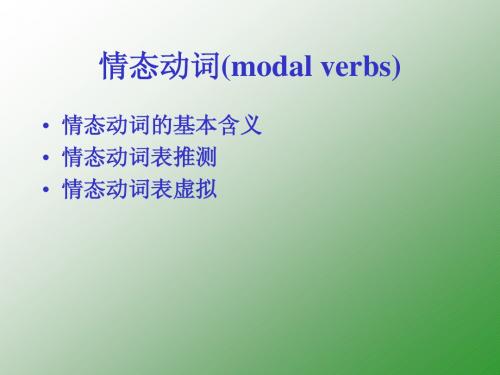
要点提示1: 1)can be able to 都能表示一般的能力,但
be able to 有更多的时态.
Байду номын сангаас
2) were able to do sth表示过去有能力而且成功的 做了某事.= manage to do sth. Eg/ The fire spread through the hotel very quickly but everyone was able to get out.
选择填空: 1. I was really anxious about you. You________home without a word.(NMET 2001) A.mustn’t have B.shouldn’t have left C.couldn’t have left D.needn’t have left 答案为B。本题考查的是情态动词在虚拟语气中的用法。 题目给出的条件是“我确实非常担心你”,因此后面 可知应是责备you不应该没说一句话就离开了。 2.—Are you coming to Jeff’s party? —I’m not sure. I__________ go to the concert instead.(NMET 2000) A.must B.would C.should D.might 答案为D。本题考查情态动词的基本用法。由题目中“I’m not sure”,表明我可能去Jeff’s party,也可能去音乐会,故用 might。
be/ get used to doing sth. Eg/ He _______(get) up early in those days. _____ you _____ to the weather? Bamboo _________to carry water. I haven’t __________having meals with fork and knife.
高中英语课件-Modal verbs (2)
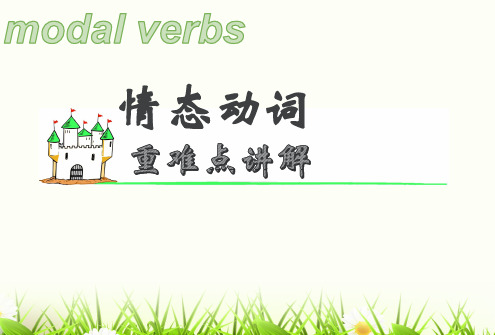
may
If you have nothing to do, you may as well go to bed. He got up so late this morning, so he might well be late for class.
would
He would spend the whole day by the river and in the evening would come home with marvellous stories of the fish he had nearly caught.
I used to climb trees, swim and play football.
1.My mother _w_o__u_ld_ tell us stories before going to bed when we were children.
2.It was sad to me that they, so poor themselves, _s_h_o__u_ld__ bring me food.
shall
1. If you perfporm well at school, you shall have more pocket money next month.
2.One of our rules is that every student shall wear school uniform while at school.
modal verb(情态动词)
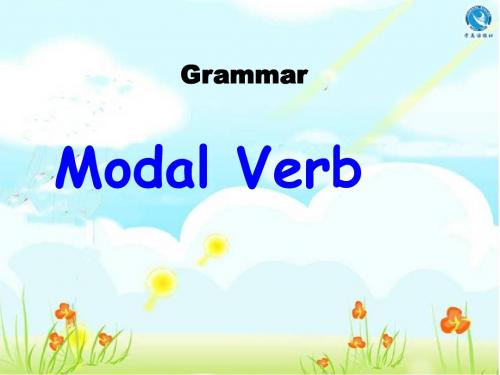
Modal Verb
什么是情态动词? (Modal Verbs) 情态动词表示说话人的某种 感情或语气,对某一动作 或状态的某种态度。 表示“需要、可以、 必须、应当”等。
情态动词的语法特征
1. 情态动词不能单独做谓语,除ought 和have外,后面只能接不带to的不定式。 2. 情态动词没有人称,数的变化,但有 些情态动词,如can, will也有一般式 和过去式的变化。
may 常用来表示: A. 表示请求、允许: B. 表示说话人的猜测: “也许” “可 能”: 通常只用于肯定句和否定句中。
C. 表示祝愿; 但语气较正式: might 的用法有: 多在间接引语中表示过去的可能和允 许。如: She said that he might take her bike. 她说他可以拿她的自行车去用。
表示现在的许可,语气比may 较委婉,
一般用于疑问句(包括间接疑问句),
不可用于肯定句或者否定句。
如: Might I have a word with you?
我可以和你说句话吗?
will和would
1. will是助动词还是情态动词?
will用于构成将来时是助动词。
用于表示“意志”“决心”“请求”是
2. 表示否定的情态动词的用法:
部分情态动词的否定式是情态动词中的 考点之一。 mustn’t 不准; 禁止 needn’t 没必要 ( = don’t have to ) can’t 不能; 不可能 may not 不可以; 可能不 shouldn’t 不应该 ( = ought not to )
表示主语的义务或责任: You should take care of your sister. 你应当去照顾你妹妹。 或指出一个正确、明智的动作: They shouldn't allow parking here; the street is too narrow. 这儿不该允许停车;马路太窄了。
英语情态动词modal-verbs
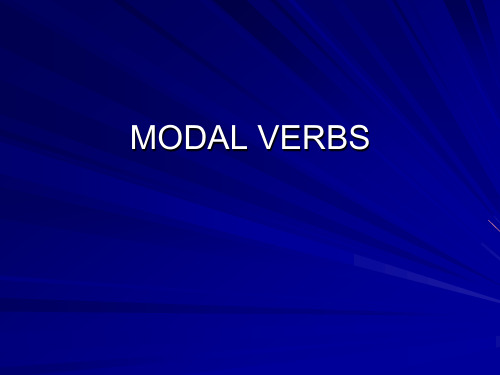
General rules:
Modal verbs are always followed by an infinitive:
• FOR PRESENT: by a present infinitive
She must go. (SIMPLE) I must be going now. (CONT.)
• FOR PAST: by a perfect infinitive
He must have done that. (SIMPLE) We must have been walking for hours. (CONTINUOUS)
MODAL VERBS IN THE PAST
2 ways of forming past tense:
2. PERMISSION ( may, can, be allowed to)
Put these sentences into past:
- She may leave now.- They are alowed to be here.
When asking for permission only the present tense is used. In the past the forms of be allowed to or could are used. The difference between can and may in this sense is the same as in Slovene (ali lahko grem / ali smem iti). May is more formal.
modal verb is the same + infinitive is changed (= perfect infinitive) present: She could be at home now. past: She could have been at home (when you were looking for her.)
高二英语教案:Modal Verbs(Can, may, must)

Modal Verbs(Can, may, must)Rui yi ling Teaching content:Modal verbs (can, may, must)Teaching aims:1. Review and master the usages of some modal verbs like “can, may, must”.2. Sum up and grasp the structures of these modal verbs.Teaching important point:How to correctly use modal verbs, esp. for the ones expressing possibility.Teaching difficult points:How to correctly choose modal verbs in different situationsTeaching type:A revision lessonTeaching methods:Review, explanation, inductive methods.Teaching aids:A projectorTeaching procedures:Step 1 GreetingsGreet the whole class as usual.Step 2 Revision and PresentationT: We have learned modal verbs before. Now let’s have a little quiz.students to write their answers on the Bb, and then check the answers with the whole class.Answers: 1. The light is on. 1) He may / might / could / be at home.2) He must be at home.2. The light is off. 1) He may not be at home.2) He can’t be at home.Step 3 ExplanationT: Let’s sum up these modal verbs. First get Ss to read through the points on Page 60 in revision book, and then show the following on the screen.He may be at home. (“Perhaps”)May He may not be at home. (“Uncertain”)You may go home. (“Permission”)(Expressing “guess” in the affirmative or interrogative.)He can’t be at home. (“Be certain---not”)It can be warm in winter. (“Occasional possibility”)Can---” “have a right to---”)Can you help me? (“Request”)(Expressing “guess” in the interrogative or neg ative.)He must be at home. (“Certain”)Must I must go home. (“What is necessary”)You mustn’t smoke here. (“Be forbidden to---”)(Expressing “guess” only in the affirmative.)T: Now let’s continue with some synonyms and sentences. Look at them on the screen.the negative. You can use either of them. “Be able to” sometimes means “succeed inStep 4 PracticeRewrite sentences. (Give Ss a few moments. Let them do some relevant exercises on the screen.)1. Perhaps we will have a good trip.We_____ have a good trip.2. I’m sure it isn’t made of gold.It _____ be made of gold.3. I’m sure that restaurant is a good one.That restaurant _____ be a good one.4. There is much gas here, you ___ smoke here.Step5 Summary of the usages of mo dal verbs which express “guess”T: All right. Look at the form on the screen.T: In affirmative sentence, we use “must+V” or “must be doing” to express present or present co ntinuous situation. “Must +have + p.p.”is used to express past situation orin the affirmative or negative. “Can” mainly in the negative or interrogative.Step 6 PracticeFill in the blanks using must/might/may/can/could and their negative forms. 1.—Look! Someone is coming: Who ____ it be?--It ___ be the headmaster.--It ___ be him. He has gone to Shanghai.--It ____ be Mr. Yang. He looks like the headmaster.2. – Could I borrow your dictionary?--Yes, of course you ____.3. I thought you ___ like something to read, so I bought you some books.4. Peter ___ come with us tonight, but he isn’t very sure yet.5. She doesn’t answer the bell. She ___ be asleep.6. The ground is wet. It ____ have rained last night.7. He is writing with a pencil. He ___ have lost his pen.8. A computer ___ think for itself; it ___ be told what to do.(Get Ss to do some exercises on the screen individually, and then discuss them in pairs, at last check their answers with the whole class.)Homework:Finish off the exercises.To continue reviewing Modal verbs.。
modal verbs 情态动词
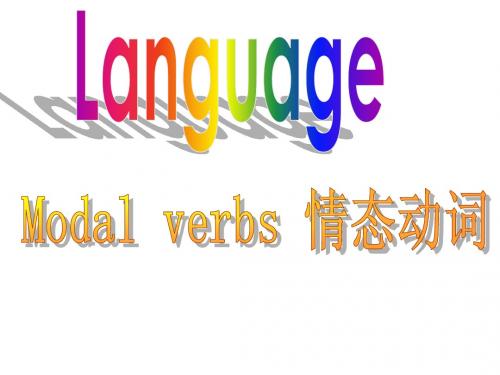
You must not cycle.
You must not enter.
You must be careful.
You must turn left.
You must pay ten yuan.
You must keep silent.
You must not smoke. You must not turn right.
★
情态动词
情态动词不能单独作谓语动词,后接其它 动词原形做谓语,没有人称和数的变化。
1. 表示能够或不能做某事用can 或 can’t;
A bird can fly . Fish can’t live without water.
2. 告诉人们必须或禁止做某事用must
或mustn’t;
You must hand in your homework at once. You mustn’t talk loudly in public.
肯定句 1. 现在时 2. 过去时 1. I can speak Chinese. 否定句 1. 现在时 2. 过去时 1. I can’t speak Chinese.
2. I could speak Chinese when I was a kid.
2. I couldn’t speak Chinese when I was a kid.
subtract ____ Can Kitty _________? Yes, she can. _____________
may (perhaps) 也许,可能
• “may” 常被用来表达可能性,也可以表示 请求。
表示请求: May I use your bathroom? 表示可能性 :I may go shopping in the afternoon. may的过去时 might He might be our new teacher. PS:might也可以表示推测,可能性比may小,语 气更婉转。
情态动词讲解课件
1.Can this be an excuse for not giving them help? 表示惊异、怀疑、不相信 2.This can’t be true. 等态度,主要用在否定句、 3.How can you be so crazy. 疑问句和感叹句中。
特别说明:
1.could用来表示请求时,语气委婉,主要用于疑问句,不能用于肯定句,答语应用can(即:could不能 用于现在时态的简略答语中)。如: ——Could I use your dictionary? ——Yes, you can.(否定回答可用:No, I’m afraid not.或者是you can’t)
1.May you succeed. 2.May you live happily! 3.May she rest in peace.愿她安息。
1.There is nothing to do, so I may as well go to bed. 2.You may as well tell us now, we’ll find out sooner or later. 3.I suppose we might as well go home.
在表示请求、允许时,might比may语气 更委婉些。用May I征询对方许可在文体 上比较正式,在日常用语中,用Can I征 询对方意见更为常见。
1.Might I borrow your pen 2.I wonder if I might speak to your son.
表示可能性的推测,通常用在肯定句和否 定句中,含有“或许”“大概”“可能” 之意;用might代替may时,则语气显得更 加不肯定。 may用于祈使句表示祝愿
1) 情态动词不能表示正在发生或已经发生的事情,只表示期待或估计某事的 发生。
初中英语情态动词:modalverbs课件人教新目标版
• 2). 你昨天一定看到她了,对不? •You must have seen her yesterday, didn’t you?
7
•三点说明
•1、情态动词 + v 表示对现在或将来动作的猜测。 • 情态动词 + have + p.p表示对过去动作的猜测。
•2、情态动词的过去式与原形相比,多点礼貌,少点冒昧, • 语气更为委婉。
•其形式为:must + have +p.p •Eg. The road is wet. It must have rained • last night.
6 •must的用法
1. must 表示推测时,其反意疑问句应根据动词的实 际时态而变化。如:
• 1). He must have a car now,_•_d_o_e_s_n_’_t _h_e__?
have
to.
•④
NeedIfinishit•Yes, you must. now?•No, you needn’t.
8
•典型错误
•1. He mustn’t be in the classroom. ( •Can’t ) •2. You might leave the bag on the desk. •(might have left )
•3.情态动词在一般疑问句中的回答: •① Can you sing? •Yes, I can.
•No, I can’t.
•② May I come in?•Yes, you may.
•No, you mustn’t/you can’t.
•③
Must
I
hadn’t
modal verbs 1
SHOULD HAVE+ PAST PARTICIPLE
To express your opinions about something in the past. Now it´s too late
Ex: He should have agreed to come to the party. It was real fun
Permission
CAN/MAY/COULD It depends on the degree of politeness
Can / May I come in? Could I come in Mr Robinson?
MODALS + PERFECT INFINITIVES (to have / ppart)
Ex: We´d better stop for petrol soon. The tank is almost emply
Use: We use it for a particular situation and not for general advice
WOULD RATHER
FORM WOULD RATHER+BARE INFINITIVE WOULD RATHER NOT+BARE INFINITIVE
MODALS EXPRESSING ABILITY
CAN: PRESENT ABILITY
EX: She can read minds.
COULD: PAST ABILITY, CONDITIONAL
Ex: At the age of five , she could read and write
modal verbs 英语解释
modal verbs 英语解释Modal verbs are a category of English verbs that are used to express possibility, necessity, permission, ability, and other similar ideas. They are unique in the sense that they do not have a specific tense and do not change form depending on the subject of the sentence. Instead, they are followed by the base form of another verb to complete the sentence.There are ten modal verbs in English: can, could, may, might, shall, should, will, would, must, and ought to. Each of these modal verbs has its own specific uses and meanings, but they all serve to modify the meaning of the main verb in a sentence. Modal verbs can also be used to express different degrees of certainty or obligation, depending on the context.One common use of modal verbs is to express ability or possibility. For example, "I can swim" or "It may rain later." In these examples, "can" and "may" are used to indicate the ability to swim and the possibility of rain, respectively.Modal verbs are also often used to express permission or obligation. For example, "You must wear a helmet" or "You may leave early if you finish your work." In these examples, "must"indicates a strong obligation to wear a helmet, while "may" grants permission to leave early under certain conditions.Modal verbs can also be used to make requests, suggestions, or offer advice. For example, "Could you help me with my homework?" or "You should get some rest." In these examples, "could" is used to make a polite request, while "should" is used to offer advice.It is important to note that modal verbs do not change form depending on the subject of the sentence, and they are always followed by the base form of another verb. For example, "She can swim" and "They can swim" have the same form of the modal verb "can," and both are followed by the base form "swim."In conclusion, modal verbs are a versatile and important part of the English language that are used to express a wide range of meanings and functions. They play a crucial role in shaping the tone and meaning of a sentence, and can convey nuances of certainty, possibility, obligation, and more. Understanding how to use modal verbs correctly can help improve your English language skills and make your communication more precise and effective.。
- 1、下载文档前请自行甄别文档内容的完整性,平台不提供额外的编辑、内容补充、找答案等附加服务。
- 2、"仅部分预览"的文档,不可在线预览部分如存在完整性等问题,可反馈申请退款(可完整预览的文档不适用该条件!)。
- 3、如文档侵犯您的权益,请联系客服反馈,我们会尽快为您处理(人工客服工作时间:9:00-18:30)。
could
may
can
possibility / impossibility
Anyone can become rich and famous if they know the right people.
Learning a language can be a real challenge.
People should unplug toasters before they clean them.
2. SHIFT TO "SHOULD" OR "OUGHT TO"
You should have unplugged the toaster before you tried to clean it.
3. SHIFTS TO "BE ABLE TO"
I will be able to speak Chinese by the time I finish my course.
1. I can't speak Swahili.
2. SHIFTS TO "COULD"
I couldn't speak Swahili.
Can
Modal Use
1. Present
2. Past
3. Future
Negative Forms
You can also use:
can
general ability
1. I can speak Chinese
2. SHIFTS TO "COULD"
I could speak Chinese when I was a kid.e late.
Theymight notcome to the party.
3. Many modal verbs cannot be used in the past tenses or the future tenses.
EXAMPLES:
Hewill cango with us.NOT CORRECT
Shemustedstudy very hard.NOT CORRECT
Common Modal Verbs
Can
Could
May
Might
Must
Ought to
Shall
Should
Will
Would
IMPORTANT: For the purposes of this tutorial, we have included some expressions which are not modal verbs includinghad better,have toandhave got to. These expressions are closely related to modals in meaning and are often interchanged with them.
2. SHIFTS TO "BE ALLOWED"
I wasn't allowed to drive Susan's car while she was out of town last week.
3.I can't drive Susan's car while she is out of town next week.
(Requests usually refer to the near future.)
can,
may,
might
Modal Use
1. Present
2. Past
3. Future
Negative Forms
You can also use:
had better
recommendation
1. SHIFT TO "SHOULD" OR "OUGHT TO"
3. SHIFTS TO "BE ABLE TO"
I won't be able to speak Swahili.
to be able
can
ability during a specific event
1. With a burst of adrenaline, people can pick up cars.
(This use is usually a generalization or an supposition.)
could
Could
Modal Use
1. Present
2. Past
3. Future
Negative Forms
You can also use:
could
possibility
1. John could be the one who stole the money.
I could run ten miles in my twenties.
I could speak Chinese when I was a kid.
I couldn't run more than a mile in my twenties.
I couldn't speak Swahili.
be able to
1. People can't pick up cars.
2. SHIFTS TO "BE ABLE TO"
Even the weight lifter, couldn't lift the car off the child's leg.
3. SHIFTS TO "BE ABLE TO"
Even three men working together won't be able to lift the car.
1. Even if I had more time, I couldn't travel around the world.
2.Even if I had had more time, I couldn't have traveled around the world.
3.Even if I had more time this winter, I could travel around the world.
(This use is usually a generalization or an supposition.)
It can't cost more than a dollar or two.
You can't be 45! I thought you were about 18 years old.
could
conditional
(can, could)
1. If I had more time, I could travel around the world.
2.If I had had more time, I could have traveled around the world.
3.If I had more time this winter, I could travel around the world.
2. SHIFTS TO "BE ABLE TO"
With a sudden burst of adrenaline, he was able to lift the car off the child's leg.
3. SHIFTS TO "BE ABLE TO"
With a sudden burst of adrenaline, he will be able to lift the car.
2.Mary couldn't have been the one who stole the money.
3.Mary couldn't possibly be charged with the crime after the police examine the evidence.
might,
may
could
suggestion
1. NO PRESENT FORM
2.You could have spent your vacation inHawaii.
3.You could spend your vacation inHawaii.
NO NEGATIVE FORMS
could
past ability
2.John could have been the one who stole the money.
3.John could be charged with the crime when the police finish the investigation.
1. Mary couldn't be the one who stole the money.
may
can
request
Can I have a glass of water?
Can you give me a lift to school?
(Requests usually refer to the near future.)
Can't I have a glass of water?
Can't you give me a lift to school?
